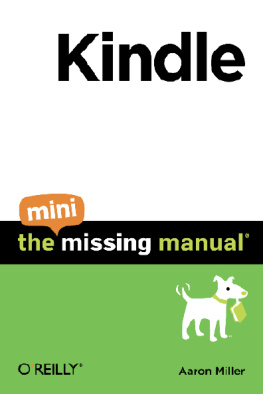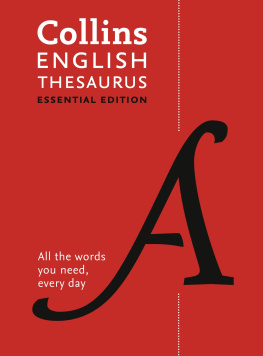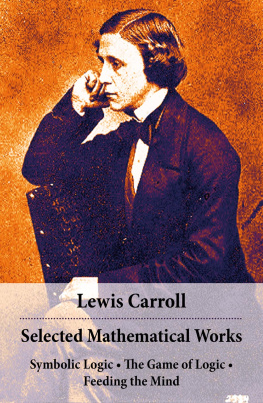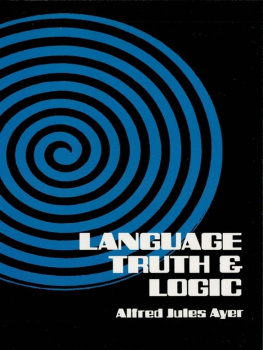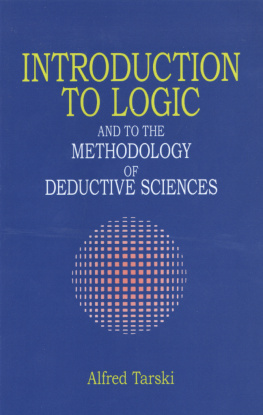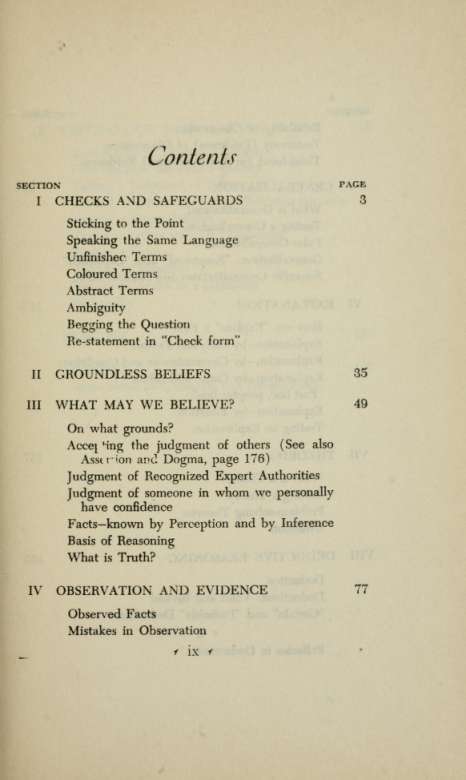This book made available by the Internet Archive.
'The trouble with most folks is not so much their ignorance, as their 'knowing so many things which ain't so."
Josh Billings
'He who cannot reason is a fool; he who will not is a bigot; he who dare not is a slave."
W. Drummond
'Ever)' argument that has been used to justify the teaching of grammar may be applied with greater cogency to the teaching of logic. If it is desirable that a person shall speak correctly, it is much more desirable that he shall think correctly."
Ballard
Digitized by the Internet Archive in 2010
http://www.archive.org/details/logicformillionsOOmand
Foreword
Thinking is skilled work. It is not true that we are naturally endowed with the ability to think clearly and logicallywithout learning how, or without gracftttfngjt is ridiculous to suppose that any less skill is required for thinking than for carpentering, or for playing tennis, golf, or bridge, or for playing some musical instrument. People with untrained minds should no more expect to think clearly and logically than people who have never learnt and never practised can expect to find themselves good carpenters, golfers, bridge-players, or pianists. Yet our world is full of people who apparently do suppose that thinking is entirely unskilled work; that thinking clearly and accurately is so easy and so "natural" that nobody need trouble to learn how to do it; that "anybody can think"; and that any one person's thinking is quite as reliable as any other person's. This accounts for the fact that, as a people, we are so much less efficient in this respect than we are in our sports. For nobody assumes that any game is so easy that
we are all first-class players "naturally," without having to learn how to play or without practice.
Those who are in earnest in wishing to think more clearly, more accurately, and more rationally should face their task in the spirit in which they would set themselves to learn the rules, to learn the technique, and to practise some new game. They should be prepared to devote as much time and attention to this as they would to learning golf, bridge, or music.
SECTION PACE
Reliability of Observation
Testimony (Evidence) of Observation
Third-hand (or Thirtieth-hand) Evidence
V GENERALIZATION 97
What is Generalization?
Testing a Generalization
False Generalization
Generalization: "Empirical" and "Explained"
Scientific Generalizations and Natural Laws
VI EXPLANATION 115
How we "Explain" a Fact
Explanationby Parts and Factors
Explanationby Circumstances and Conditions
Explanationby Cause and Effect
"Post hoc, propter hoc"
Explanationby Function
Testing an Explanation
VII THEORIES 137
What is a Theory? Testing a Theory Problem-solving Theories Evolution
VIII DEDUCTIVE REASONING 155
Deduction
Deductions: Valid and Invalid
"Certain" and "Probable" Deductions
/ X t Fallacies in Deduction
SECTION PAGE
IX TESTING OUR 'GROUNDS' FOR BELIEF 175
Bare Assertion; Dogma; Tradition
Classification: the First Necessity
Testing a Judgment of Others
Testing an Observed Fact (or Evidence thereof)
Testing a Generalization
Testing whether a fact is "Explained"
Testing a Theory
Testing a Deduction
Testing an Axiom or a Definition
Probability
X PRACTICE 193
APPENDIX 197
Some Notes on Causation and Determinacy
LOGIC FOR THE MILLIONS
Section I Checks and Safeguards
STICKING TO THE POINT
The first essential to clear thinking (and speaking) is the ability to "see" the pointto recognize what exactly is the point in questionand then to stick to that point until it has been dealt with.
It is the mark of a vague, muddled, and feeble thinker (or speaker) that he drifts always from one point to another; wandering hither and thither; never settling anything; quitting each question in turn as soon as another attracts his attention; leaving every "hare" immediately another is started, and following that one only until yet another appears; "mind wandering"; not thinking.
A clear thinker "sees" the point at issue; recognizes exactly what it is he wants to know, or wants to decide; sets to work to sort out all the relevant
facts and arguments from others which are irrelevant; considers only those which are relevant to the question before him; thinks always with purpose, keeping steadily in mind the question that is to be answered, the problem that is to be solved.
All real, constructive thinking is aimed at answering some question, solving some problem, making some decision. Much of what is commonly called thinking (and much talking) is indeed nothing more than "mind wandering."
Let us cultivate the habit of considering one point at a time, and sticking to that point until we have made up our minds about it. Let us not drift about from one question to another, in the end leaving everything "in the air," unsettled, unsolved. The best way to develop as clear thinkers is to think always by the method of asking ourselves questions and then striving to answer them; and always answering each question before passing on to the next. It is useful to state the question definitelyif possible, to put it down in writing and then refer to it, and come back to it again and again and again.
SPEAKING THE SAME LANGUAGE
To say that two persons speak the same language is to say that they use the same words with the same meanings. When we say that we are all English-speaking people, that signifies only that the majority of everyday words mean more or less the same thing to all of us. But there are many words which have different meanings to different persons. Probably no two persons speak exactly the same language.
We should note that a language is not merely a collection of words: it is the relation of words to meanings. To speak or write the same words does not of itself show that we are using the same language. The word "genial" occurs in both German and English; but if a German were to use the word in the German sense and we were to accept it in the English sense, we should completely misunderstand him. The word "lovely" is commonly used in slightly different senses in England and New Zealand. The word "Solicitor" means something quite different in America from what it means in England: in America it means one who solicits orders, a salesman or commercial traveller;
in English it means a lawyer. "Dumb," likewise, has a meaning in America different from the meaning it has in England.
Again, there is a word, "conscience," in both French and English. But if a Frenchman were to use the word in the French sense, and we were to accept it in the English sense, we should entirely misunderstand his meaning. We speak different languages. Yet because German and French and English are so widely different, we are not likely to be misled when a German or a Frenchman, speaking his language, happens to use a word which occurs in our language too. We recognize that we speak different languages; and so we are on our guard against confusing his use of the word with our own.




